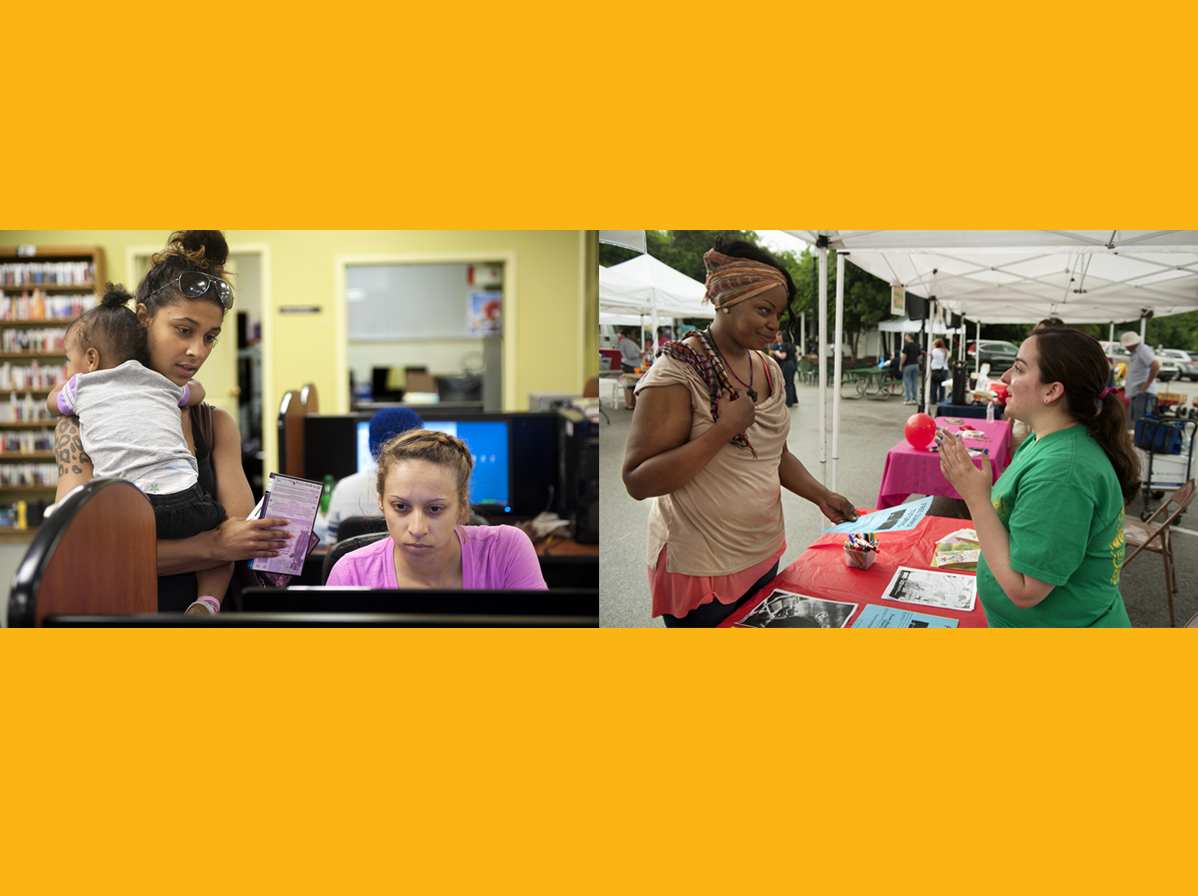
Posted on November 4, 2015
During the time of unrest in Ferguson, we at the Ferguson Municipal Public Library (FMPL) made a conscious decision to simply stay open for our community. We forged many vital relationships during those difficult days by providing empathy, respect, and comfort to the people in our community.
Empathy and Respect – Keeping our doors open during the hard days created a shift in how the people of Ferguson thought of their library. The empathy and respect we showed our patrons created a synergistic boost to the community as a whole.
Understand patrons, and respect them as people. Everything else grows from this, but you have to really mean it. If you care deeply about your community, it shows in every conversation, decision, and service. This cannot be an abstract thing—caring in aggregate but not in specific. It’s about building actual relationships. After all, we serve each patron as a person, individually.
The need for empathy and respect only increases during problematic circumstances. If a patron I speak with regularly displays problematic behaviors, I have soft options (explaining, humor, just talking) available to curb the behavior. If I let that patron be a stranger, I am left with hard options (ban, limit). I ban patrons when I must, but rarely have to; serving the community means serving every person in it.
Openness – Part of being very active in the community is occasionally taking risks. Last fall, the library was the centerpiece of 14 venue art exhibit organized by the St. Louis Alliance of Black Art Galleries—Hands Up, Don’t Shoot: Artists Respond. The title alone generated very strong complaints from a handful of influential residents who thought the library was, “picking sides” and “opposed to the police.” I needed to respect that anger, address it, and justify my decision—laying heart and mind bare.
My choice was driven by compassion and a need to encourage healing in the community. I described the library’s mission of cultural literacy and how a contemporary art show, on topics of vital interest to the community, was accomplishing exactly that. Using specific examples of families I knew whom had been helped by similar programs advocated that the show could restore conversations, where people were formerly talking past each other.
Explaining the on-the-spot choices I made in detail and recreating those complex exchanges, leaving nothing left unsaid, allowed them to see how I got where I was. I wouldn’t say everyone left happy, but they did agree to hold judgment until the art was hung. In the end, the art went up, and the show was a success. Even the community members that had reservations said, “It wasn’t so bad, really.” Through open communication and respectful conversation, our community was allowed to move forward peacefully without huge political fallout.
Another way to allow openness is to simply be open. I made a decision to be open any day that it was safe to do so, and it was almost always safe to do so. At every opportunity, I made sure to say, “The library welcomes every human being in Ferguson!” And, FMPL followed through. Outside, a sign read, “Stay Strong Ferguson. We are Family.” Inside, another sign read, “During difficult times, the library is a Quiet Oasis where we can catch our breath, learn, and think about what to do next.”
Communication – Since our patrons have varying technologies available to them, we adopted multiple avenues to communicate. We used signage, as well as flyers, articles in the Ferguson Times, and other tangible materials. Social media gave us the power to be interactive, have conversations, and reach out through real time pictures. Without Twitter and Facebook, we would have missed a big chunk of our patron base, as well as, allies across the country. No one would even know what we had been up to.
During the darker days, I let my heart get into my social media posts, trying to offer hope.
And of course, I just talk to people. The best opportunities to identify patron needs and develop solutions happen in one-on-one conversations. This is where that empathy and respect come into play, as the building blocks of any healthy relationship.
Opportunities seem to present themselves in these situations too. Rarely do I talk to anyone without mentioning programing, “Seeing how you run the bank, how would you feel about, say, putting together a Financial Literacy program with the library?”
Mission – At all times, I try to keep the 3-pronged mission of public libraries in mind: lifelong learning, cultural literacy, and bringing the community together. All the other tools are means to this end. If I can justify a program, we do it. Sometimes we do too much, and that’s okay.
We need meaningful, personal relationships with patrons and community partners. With empathy and respect in play, you cannot but help but build community.Nike Air Max 200

